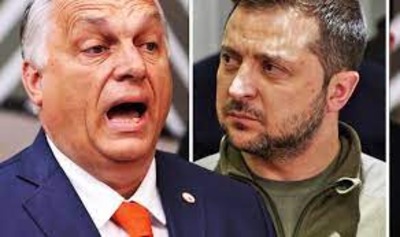The European Union leaders are set to discuss the extension of 50 billion euros ($54 billion) in new financial aid to Ukraine and replenishing a fund for arming Kyiv. This decision is crucial for Ukraine’s efforts in resisting Russia’s full-scale invasion, which began two years ago. Ukraine, a former Soviet republic, currently aspires to join the European Union and NATO.
The financial aid is considered essential for Ukraine’s survival, given the ongoing conflict with Russia. However, there is a potential hurdle, as Hungary may pose a challenge to the proposed measures. The EU leaders will convene to reach an agreement on Thursday, and the outcome will significantly impact Ukraine’s ability to withstand external pressures.
Join us on Telegram: https://t.me/tfiglobal
Prime Minister Viktor Orban of Hungary has publicly emphasized his connections with the Kremlin, deviating from the broader European Union (EU) stance of isolating Moscow due to the ongoing conflict. Last month, Budapest exercised its veto power, blocking financial aid to Kyiv, and has expressed reservations regarding military support.
The approval of aid to Ukraine from the EU’s shared budget necessitates unanimous agreement among the 27 national leaders convening in Brussels. Given the significance of the situation, the EU has increased its efforts to exert pressure on Orban. However, uncertainty prevails, as sources in the EU hub, Brussels, reported before the summit that it remains unclear whether Budapest will align with the unanimous determination of the other 26 member countries.
EU leaders will deliberate on budgetary aid for Ukraine during closed-door discussions. As of late Wednesday, there is no finalized agreement with Budapest regarding the allocation of 50 billion euros from the bloc’s shared budget until 2027.
To garner support from Prime Minister Viktor Orban, the EU proposed an annual debate on the matter, avoiding a comprehensive budgetary review that could grant Budapest veto power in subsequent discussions. The ongoing disagreement intertwines with a protracted dispute between the EU and Orban, leading to the freezing of billions of euros earmarked for Hungary in the shared EU coffers due to concerns about democratic backsliding.
Read More: Code Red for the EU: Ignoring Russia Sparks Crisis
In the event that Orban maintains his position, the EU is exploring alternative means of assisting Ukraine. However, each alternative is anticipated to be more intricate, time-consuming, or costly.
The draft summit conclusions have not definitively outlined whether leaders will commit an additional 5 billion euros to the European Peace Facility (EPF), a fund utilized for supplying weapons to Kyiv. Disagreements among EU members persist regarding the fund’s future role in providing military aid to Ukraine, with Germany proposing a shift towards bilateral aid from individual countries.
On Wednesday, the EU’s chief diplomat indicated that the bloc is unlikely to meet its goal of sending one million artillery shells to Ukraine by March. Concurrently, Hungary has intensified its criticism of the EU’s military support for Ukraine. In the past, Hungary has delayed disbursing hundreds of millions of euros from the EPF.
Swedish Prime Minister Ulf Kristersson plans to meet with Hungarian Prime Minister Viktor Orban in Brussels to seek Hungary’s approval for Sweden’s membership in NATO. Despite Turkey’s recent endorsement after a prolonged delay, Hungary remains the sole NATO member yet to give its consent to Sweden’s alliance inclusion.
Read More: Classy!Ukraine sends Hungary Death Threats
While many EU countries are also NATO members, it is essential to note that the European Union and NATO are distinct entities. The summit scheduled for Thursday does not have the mandate to determine Sweden’s NATO membership application, which was submitted in the aftermath of Russia’s assault on Ukraine.
EU leaders are anticipated to address various topics during their discussions. These include considerations for increased spending on managing migration, the ongoing conflict between Israel and Hamas, the broader situation in the Middle East, and the current farmer strikes occurring in several European countries.
The EU leaders’ decision on Thursday will significantly impact Ukraine’s ability to resist Russia’s ongoing invasion and Hungary’s standoff poses a critical challenge to the extension of financial aid and military support for Ukraine by the European Union.
